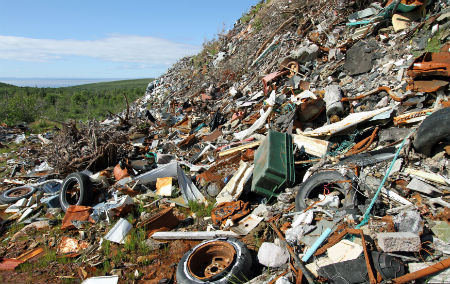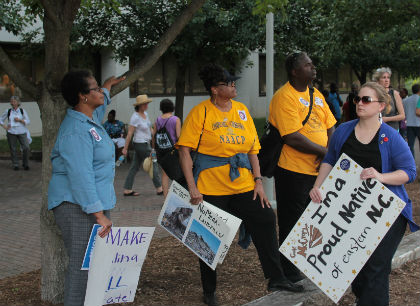RALEIGH—Tighter landfill restrictions put in place in 2007, including size, height and proximity to natural resources and poor and minority neighborhoods could be repealed under a senate bill scheduled to be heard in the Senate Finance Committee on Wednesday.
A modification to the Solid Waste Management Reform Act of 2013, originally introduced to tighten restrictions on garbage trucks, was introduced June 6. It added an extensive set of new policy provisions for landfills.
Supporter Spotlight
 Proposed changes to landfill legislation could roll back several policy provisions. |
Changes proposed to that legislation in the new version of the senate bill would:
• reduce distance requirements from state parks (2 miles), state gamelands(1 mile) and National Wildlife Refuges (5 miles) to 1,500 feet;
• repeal restrictions on locating landfills near minority and low-income neighborhoods;
• eliminate buffers for wetlands and streams;
• extend permits from 10 years to 30 years and tighten criteria for permit denials;
Supporter Spotlight
• reduce financial assurance requirements;
• raise the cap on height from 250 to 300 feet.
Ahead of Wednesday’s meeting on the new version of the bill, environmental groups and other concerned residents of prospective sites are trying to raise awareness about the proposal changes, especially on the coast, where proposed “mega-landfill” projects led to a 2006 moratorium and a study of the state’s solid waste policies. The study was used to draft the 2007 legislation.
 “Moral Mondays” protesters at the legislature June 17 express their opposition to rolling back environmental protections placed on landfills. Photo: Kirk Ross |
Esther Murphy was one of more than 1,000 people protesting on the Halifax mall behind the Legislature Building Monday evening. Murphy, a resident of New Hanover County, said she remembers the fight over the proposed Hugo Neu project and is upset, but not surprised, that many communities will have to fight again if the new bill is passed.
“We knew it was coming back,” she said. “We’re fighting a lot of environmental issues with this legislature.”
Leola Booth, a resident of Orange County and a neighbor of a large landfill near Chapel Hill, said regulations on landfill need to be tightened, not rolled back. All three of her children who grew up in the shadow of a landfill have had forms of cancer. “I think it’s horrible,” she said of the prospect of lifting the restrictions.
Mark Dorosin, managing attorney for the UNC Center for Civil Rights, said he’s concerned that lifting the restrictions on placing landfills near poor and minority neighborhoods takes the state back to a time when such neighborhoods were used repeatedly for locating unpopular or potential hazardous facilities.
“With the 2007 act we saw significant gains in protection for areas that historically were dumped on over and over again,” he said. “The impact of the proposed changes would remove the protections and allow both potential new mega-landfills and local governments looking to expand their landfills to return to the practice.”
Another fight against the Big Bear landfill in Camden County and others pitted local communities against the country’s biggest waste haulers. The state agreed to compensate some of the waste haulers who had sought permits for the mega landfills, but Waste Industries, developer of the Big Bear project, challenged it in court. The company eventually lost the case.
Now, companies that had ruled out North Carolina may get another crack at setting up regional landfills again, according to Molly Diggins, executive director of the state chapter of the Sierra Club, which was part of the Big Bear lawsuit.
“This bill is clearly intended to promote private landfills in North Carolina and make it attractive to out-of-state waste haulers,” Diggins said Monday. Early in the session, she said, there had been talk that waste haulers were seeking some changes, but there was no indication they would be as extensive as what’s proposed, particularly the rollback of environmental and community safeguards.
The state did a thorough job of reviewing its rules in relation to other states during the moratorium, she said. Now changes are being made without taking that study into consideration and despite added capacity in the landfills.
“Certainly we did not expect anything as drastic as this,” Diggins said. “They’re trying to make North Carolina the most friendly state in the region to out-of-state haulers.”
Officials from Chesapeake, Virginia also expressed reservations.
“The City of Chesapeake is concerned that Senate Bill 328 will allow the construction and operation of the Camden County landfill proposed by Black Bear Disposal, LLC,” said Jan L. Proctor, city attorney in an e-mailed statement. “The landfill would be constructed in the watershed of the Northwest River, a primary source of drinking water for the City of Chesapeake. On behalf of its citizens and in the interest of public safety, the City will make every effort to protect the quality of its drinking water. The landfill would also impact other natural resources and potentially interfere with military operations with the Northwest Annex.”
Rep. Pricey Harrison, D-Guilford, who helped draft and negotiate the original restrictions, said she was frustrated by the proposal. “I thought we had reached a good framework [in 2007],” she said.
“There seems to be a pattern of rolling back every carefully constructed environmental agreement we’ve made,” she said. “It doesn’t give me a lot of confidence in what the regulation of the environment is going to be like in North Carolina.”
Harrison said the bill would likely have a significant impact east of I-95 where waste haulers showed an interest before.
Drew Elliot, spokesman for the state Department of Environment and Natural Resources, declined to comment on specifics of the bill until a new version is introduced. “There have been changes,” he said, “but we want to see what comes out in the committee,” he said.
In an official statement, he wrote, “The department was concerned about the legislation, and we thank General Assembly members for allowing us to work closely to provide input. With changes, the bill can provide solid waste disposal options without compromising environmental considerations.”
The statement continued, “We need to ensure consistency with existing federal regulations and provide ample opportunity for discussion, consideration and mitigation of environmental impacts prior to regulatory approval. The environmental approval authority should rest with the state’s environmental experts. The decision about whether to allow a landfill in a county is a local decision.”
Wednesday’s meeting should provide further information about what, if any, changes have been made to the legislation.







